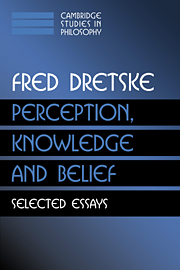8 - Differences That Make No Difference
Published online by Cambridge University Press: 19 December 2009
Summary
Never mind differences that make no difference. There are none. I want to talk, instead, about differences that do not make a difference to anyone, differences of which no one is aware. There are lots of these.
According to Daniel Dennett, though, there are fewer than you might have thought. There are, to be sure, physical differences – even some that exist in you – of which you are not aware. There are also conscious events in me, and differences among them, that you don't know about. But there are no conscious events in you that escape your attention. If you do not believe yourself to be having conscious experience φ, then φ is not a conscious experience at all. Dennett calls this view, a view that denies the possibility in principle of consciousness in the absence of a subject's belief in that consciousness, first-person operationalism. Dennett is a first-person operationalist. For him there are no facts about one's own conscious life – no, as it were, conscious facts – of which one is not conscious.
Philosophers like to call each other names. I'm no exception. The preferred term of abuse these days, especially among materialists, seems to be “Cartesian.” So I will use it. First-person operationalism sounds like warmed-over Cartesianism to me. For Descartes, the mind is an open book. Everything that happens there is known to be happening there by the person in whom it is happening.
- Type
- Chapter
- Information
- Perception, Knowledge and BeliefSelected Essays, pp. 138 - 157Publisher: Cambridge University PressPrint publication year: 2000

